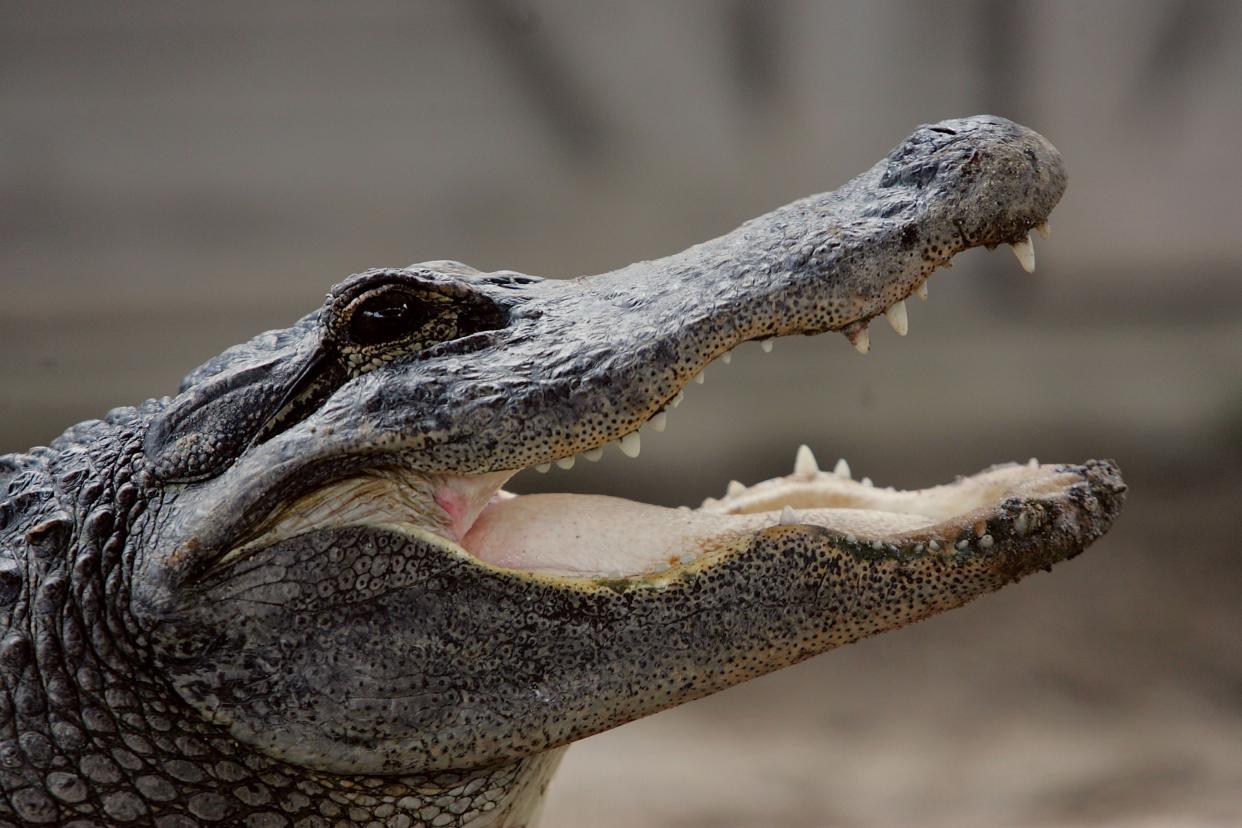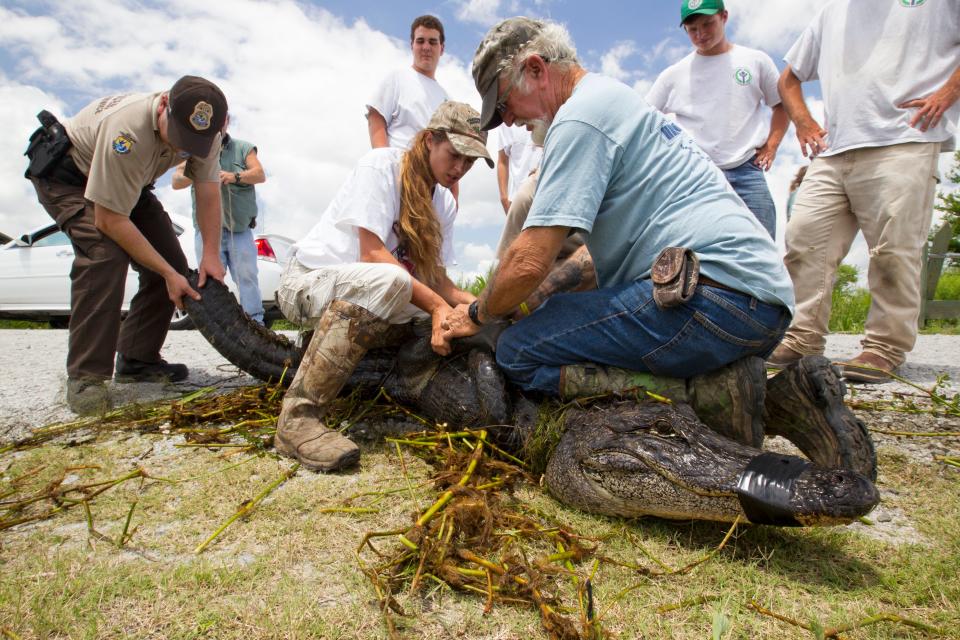When alligators attack: What experts recommend to respect wildlife, keep safe

A July 4 alligator attack on Hilton Head Island that killed a 69-year-old woman who was walking her dog has Lowcountry residents considering how to avoid the dangerous scenario.
Alligators are part of of coastal Georgia's ecosystem, and local alligator experts offered insights into the species and how humans can avoid negative interactions with the large reptiles.
FYI: How rare are alligator attacks? What to do if you see one
Background: Woman killed in alligator attack while walking dog, South Carolina sheriff’s office says
Alligator attacks are more rare in Georgia
This week's death in South Carolina was the second fatal alligator attack to happen in Beaufort County in less than a year after an 88-year-old woman was attacked by an alligator and killed in nearby Sun City in August 2022.
On the Georgia coast, a woman died in 2007 atTthe Landings due to an alligator attack, resulting in a lengthy legal battle regarding the safety and management of the gated-community's lagoons. But according to Georgia Department of Natural Resources wildlife biologist Kara Nitschke, there's a reason these attacks are a bit less common in the Georgia than in neighboring states.
"I think it's because of the development (in South Carolina and Florida) of those islands and people broaching on alligator habitat more so there than they do here in Georgia," Nitschke said.
She works in game management for the Georgia DNR's Wildlife Resources Division with alligators as one of her areas of specialty. She said the state has done a lot of work to conserve wetlands, marshes and coastal ecosystems where alligators thrive, which reduces their interactions with humans.
According to Georgia DNR statistics, since 1980 there have been nine reported cases of alligator attacks on humans in Georgia, and only one of those was fatal — the attack at the Landings.
In Florida: 'I came down on the alligator with all my weight': Florida woman, 74, fights off gator to save dog

Keep safe, keep to yourself
While Georgia has few alligator attacks, human interactions with the species are becoming more common as development encroaches into their habitat. Georgia DNR, as well as municipal governments such as Chatham County, turn to Jack Douglas, also known as "Trapper Jack," to safely remove gators where they get too close to people.
"Do not feed them," Trapper Jack said, a common refrain across the board when it comes to human-wildlife interactions. He's an over-30-year veteran of the alligator trapping business and said usually when he's called in it is either because someone was feeding a gator, which is highly dangerous, or an aggressive mother alligators with hatchlings.
Nitschke said feeding alligators creates a worst-case scenario. Alligators don't necessarily have the ability to discern where a food product ends and a human body begins, leading to equating people with food.
Beyond feeding, both Trapper Jack and Nitschke both warn people to not get too close to the waterline this time of year. During the winter there are far fewer calls for alligator removal, but during the summer the reptiles bask in the shallow edges of water and up on the grass.
Nitschke advises Georgians in gators' native range to assume any body of water contains an alligator, whether it's a river, a creek or a golf course retention pond. She reminded residents to give a 10- to 15-foot buffer between you, your pet and the water's edge at the very least. Like this July's fatality in South Carolina, she said attacks unfortunately have involved pets being walked near water.
If you do come upon one, Trapper Jack said to keep an eye on the gator and slowly move away. Importantly, he noted that people shouldn't put themselves between gators and the water since that is where the alligator will flee, too. If the alligator is somewhere it could be a danger, he said to call the police or the Georgia DNR, which will send out someone to trap and relocate the alligator.
Trapper Jack relocates alligators under 6 feet long in the Savannah or Ogeechee rivers, depending on where the alligator was caught, so they don't go directly back to where they were a nuisance. Alternatively, if folks have a beaver problem, resource agencies employ Trapper Jack to bring an alligator to where the beavers are to control that population. If the alligator is over 7 feet long, Trapper Jack said they are slaughtered for meat and skin.
"Last couple of years with all these huge bodies of timber totally cleared out for building, it's put them in a mighty small corner," Trapper Jack said. "And we have to be much more careful when we go in that lil' corner."
Alligator 101
The American alligator — Alligator mississippiensis — is native to Georgia. Laying low in our coastal ponds or lumbering their way across golf courses, the ancient reptiles are abundant throughout the lower portion of the state. They are so plentiful that many Georgians may be surprised to learn that the species nearly went extinct in the 1950s and '60s due to overhunting for their skins and meat, but after careful protections and conservation efforts by the state gators were restored to their current populations.
Nitschke said that alligators can be found in Georgia below the fall line, from Columbus to Macon and Augusta. Geologically the fall line marks the prehistoric shoreline of the Atlantic Ocean, and nowadays it serves as the boundary between the piedmont and coastal plains of Georgia. In the gator's native range, Nitschke said the DNR conducts surveys each year of the population on consistent routes by boat as well as aerial observations to keep tabs on the state's alligator population. Anecdotally, she said alligator complaints above the fall line are becoming more frequent, but the reasons have not yet been studied.
"We want to keep a certain amount of gators per mile of survey route run, and want to keep it within a range," Nitschke said. This is to ensure quotas for the numbers of alligators that can be harvested during hunting season can be tweaked to ensure a healthy population.
Alligator hunting season takes place from mid-August to early October. Those interested must apply by July 15, according to the Georgia DNR's website, and permits are issued based on a lottery system.
While some coastal residents might say they could do without the nuisance, alligators play an important role in the local environment. They can be considered a keystone species because they are, to a degree, habitat engineers: When it is dry or water levels are particularly low, gators will dig holes for water, ephemeral little ponds, that a multitude of other species rely on for habitats and ecosystems. They also control populations of other animals such as deer and beavers.
Marisa is an environmental journalist covering climate and the coast. She can be reached at mmecke@gannett.com or at 912-328-4411.
This article originally appeared on Savannah Morning News: Alligator attacks how to keep distance, maintain positive interactions

